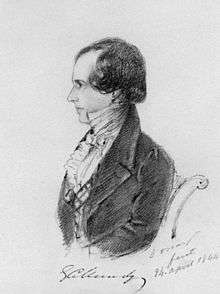Godfrey Mundy
Major-General Godfrey Charles Mundy (10 March 1804 – 10 July 1860) was a British Army officer who became Lieutenant Governor of Jersey.
Godfrey Charles Mundy | |
|---|---|
 Major-General Godfrey Charles Mundy | |
| Born | 10 March 1804 |
| Died | 10 July 1860 (aged 56) |
| Allegiance | |
| Service/ | |
| Years of service | 1821–1860 |
| Rank | Major-General |
| Battles/wars | Crimean War |
Military career
Mundy was commissioned as a lieutenant in the British Army in 1821.[1] He took part in the Siege of Bharatpur in the Indian princely state of Baharatpur in 1825 before being made Deputy Adjutant General of the military forces in Australia in 1826.[1]. He was appointed Assistant Under Secretary at the Colonial Office from March to September 1854.[2] He served as Permanent Under Secretary in the War Office during the Crimean War and was appointed Lieutenant Governor of Jersey in 1857.[1] He died in office in 1860.[1] He was author of the book Our Antipodes: or, Residence and Rambles in the Australasian Colonies, with a glimpse of the Gold-Fields.[3]
Family
In 1848 he married Lady Louisa Catherine Georgina Herbert; they had one son, Herbert Godfrey Mundy.[4]
References
- "Mundy, Godfrey Charles (1804–1860)". Australian Dictionary of Biography. Retrieved 14 July 2012.
- Sainty, J.C. (1976). "Alphabetical list of officials: British History Online". www.british-history.ac.uk. University of London. pp. 36–51. Retrieved 26 September 2019.
- Godfrey Charles Mundy (1855). Our Antipodes: or, Residence and rambles in the Australasian colonies, with a glimpse of the gold fields. R. Bentley. Retrieved 14 July 2012.
- Bessie Newenham Stuart. The Peerage.com. Retrieved on 2012-07-14.
| Government offices | ||
|---|---|---|
| Preceded by Sir Frederick Love |
Lieutenant Governor of Jersey 1857–1860 |
Succeeded by Sir Robert Douglas |